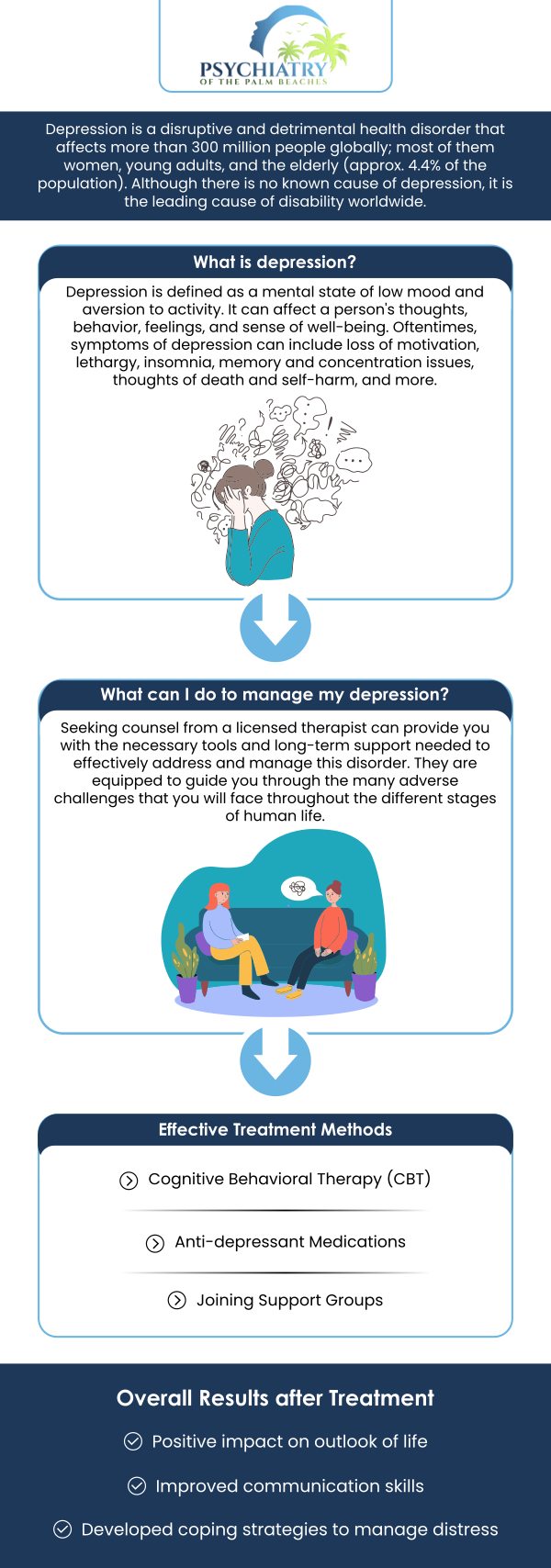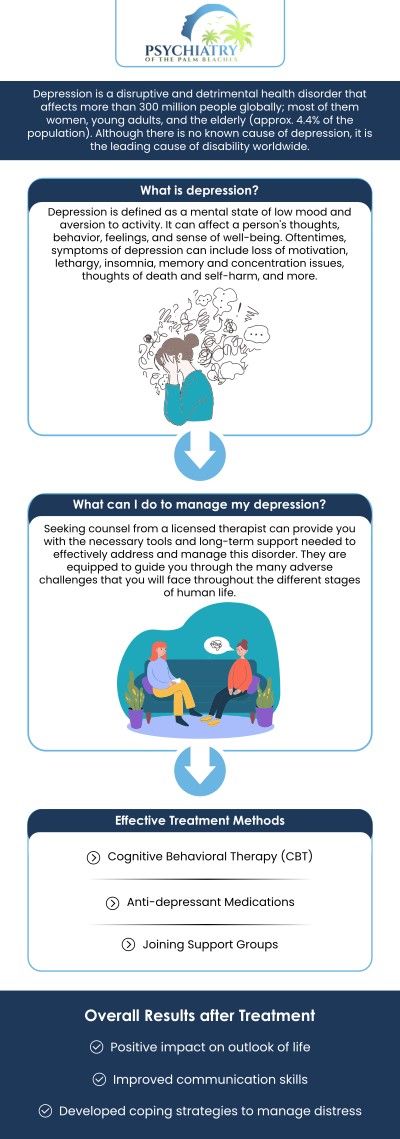Postpartum Depression Treatment Clinic Q&A
Postpartum depression is a serious mental illness that impacts the brain, leading to changes in behavior and physical health. Postpartum depression is available at Psychiatry of the Palm Beaches. Book your next appointment right away and meet our team of healthcare professionals now. You are not alone! For more information, contact us or book an appointment online. We have convenient locations to serve you in Jacksonville, Boynton Beach, Palm Beach Gardens, Stuart, Royal Palm Beach, Port St. Lucie, Melbourne, Fort Lauderdale, and Jupiter, FL.




Table of Contents:
What does it mean when you have postpartum?
What is postpartum depression mainly caused by?
What are the symptoms of postpartum depression?
What is the most appropriate treatment for PPD?
Postpartum refers to the period after childbirth when significant changes occur in both the body and mind. It is common for many women to experience the “baby blues,” feeling sad or empty within a few days after giving birth, and these feelings typically subside within 3 to 5 days. In the instance that these emotions endure for over 2 weeks, and you consistently experience feelings of emptiness, overwhelming sadness, or lack of emotion it could indicate the presence of postpartum depression (PPD).
PPD is a serious mental illness that impacts the brain, leading to changes in behavior and physical health. Some women may even feel disconnected from their baby, questioning their ability to love and care for the child. These feelings can vary in intensity, ranging from mild to severe.
PPD does not have a single identifiable cause but is believed to arise from a combination of physical and emotional factors. It is essential to understand that PPD does not occur due to something a mother does or does not do. After childbirth, the rapid drop in hormone levels (estrogen and progesterone) can lead to chemical changes in the brain, potentially triggering mood swings and emotional fluctuations.
The challenges new moms face in obtaining sufficient rest after giving birth can also contribute to the development of PPD. Sleep deprivation frequently leads to bodily discomfort and extreme fatigue, which can worsen the symptoms of postpartum depression.
All pregnant women are at risk for PPD, regardless of age, race, ethnicity, or economic status. However, some individuals may have a higher likelihood of developing it. Women with a personal or family history of depression or prior experience with postpartum depression are at increased risk.
Additionally, the experience of external stressful life events during pregnancy or shortly after giving birth are capable of contributing to the onset of PPD. Other risk factors include medical complications during childbirth, mixed feelings about the pregnancy (whether planned or unplanned), a lack of strong emotional support from loved ones, and alcohol or drug abuse problems.
After giving birth, some women experience normal changes that may lead to symptoms resembling depression. Feeling overwhelmed when a new baby arrives is not uncommon for many mothers. However, when these symptoms last or persist, particularly for more than two weeks, it could be suggestive of PPD.
While each individual’s experience with PPD may differ, some common symptoms include feelings of sadness or emptiness, constant fatigue or lack of energy, changes in appetite or weight, difficulty sleeping or sleeping too much, a loss of interest in activities once enjoyed, feelings of worthlessness or guilt, trouble concentrating or making decisions, and thoughts of harming oneself or the baby.
The most appropriate treatment for PPD typically involves a combination of psychotherapy and, in some cases, the use of antidepressant medication. Psychotherapy offers a valuable opportunity to discuss your concerns and feelings with a psychiatrist, psychologist, or other mental health professional.
Through therapy, you can develop effective coping mechanisms, address problems, set achievable goals, and learn to respond positively to challenging situations. In some instances, family or relationship therapy may also prove beneficial.
In addition to psychotherapy, your healthcare provider may recommend antidepressant medication as part of your treatment plan. If you are breastfeeding, it’s essential to consider the potential effects of medication on your baby.
However, most antidepressants can be used during breastfeeding with minimal risk of side effects. It’s crucial to collaborate with your healthcare provider to assess the potential risks and benefits of specific antidepressants in your individual situation.
Depending on your specific symptoms and needs, other medicines may be prescribed as part of your treatment. For instance, if you experience severe anxiety or insomnia alongside postpartum depression, your healthcare provider might recommend a short-term course of anti-anxiety medication.
Postpartum depression is available at Psychiatry of the Palm Beaches. For more information, please feel free to contact us or schedule an appointment online. We have convenient locations to serve you. We serve patients from Boynton Beach FL, Delray Beach FL, Palm Beach Gardens FL, Jupiter FL, Stuart FL, Palm City FL, Royal Palm Beach FL, Wellington FL, Citrus Ridge FL, Jacksonville FL, Riverside FL, Port St. Lucie FL, Beau Rivage West FL, Melbourne FL, Palm Bay FL, Fort Lauderdale FL, Hollywood FL, Jupiter FL, North Palm Beach FL, and surrounding areas.
Check Out Our 5 Star Reviews



Additional Services You May Need
▸ Mental Wellness
▸ Relationship Coaching
▸ Depression and Mood Disorders
▸ Women’s Health
▸ Panic Disorder
▸ Medications Management
▸ Men’s Health
▸ Individual Psychotherapy
▸ Bipolar
▸ ADHD
▸ Geriatric Mental Health
▸ Couple’s Counseling
▸ Obsessive Compulsive Disorder
▸ Social Phobia Treatment
▸ Eating Disorders
▸ Post Traumatic Stress Disorder
▸ Psychotic Disorders


